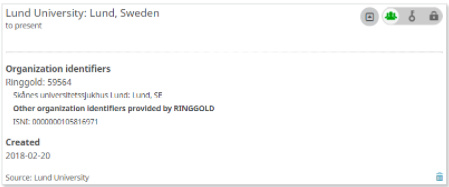In this month’s Collect & Connect post we focus on the different kinds of assertions – or trusted connections – that ORCID member organizations are making to their researchers’ ORCID records. Affiliations, awards, works and, launching soon, the use of research resources such as laboratories, special collections, equipment, and more – all these and more can be asserted, following our Collect & Connect guidelines.
If you are planning to assert employment or education affiliations, in order to control how your organization’s name is displayed to funders, publishers and other research organizations, make sure to follow our best practices. Likewise, if you’re asserting your researchers’ works, please check out our guidelines for publishers. And if you are interested in adopting ORCID to capture and assert your organizations’ facilities and resources use, you can join our working group or be part of one of the pilot projects.
We hope these examples will inspire you to implement ORCID within your community and play your part in building trust in the research information infrastructure.
Asserting Affiliations
 Lunds Universitet, a member of our Swedish consortium SUNET, has integrated with their current research information system LUCRIS. Lunds Universitet researchers can add their ORCID iD to the university’s personal and address directory and, within 24 hours, their iD is imported from the directory to their PURE profile. Researchers can then choose to export their affiliation, works and the link to their public portal page to their ORCID records.
Lunds Universitet, a member of our Swedish consortium SUNET, has integrated with their current research information system LUCRIS. Lunds Universitet researchers can add their ORCID iD to the university’s personal and address directory and, within 24 hours, their iD is imported from the directory to their PURE profile. Researchers can then choose to export their affiliation, works and the link to their public portal page to their ORCID records.
The University of Canterbury, a member of our New Zealand consortium Royal Society Te Apārangi, has recently launched their second integration. By using the New Zealand ORCID Hub, University of Canterbury collects researchers ORCID iDs and connects affiliation information to their records.
Asserting Works
Kyoto University, one of the Japan’s top universities, has recently launched its second integration with Society2iD. Society2iD is a platform developed by ORCID member Atlas which, like the New Zealand Hub, allows societies and institutions with limited resources to connect affiliations and research output to ORCID records. KURENAI, the Kyoto University Research Information Repository, collects researchers’ ORCID iDs and connects their research output to their records, complementing their first integration connecting affiliation to researchers’ records.
Coming soon… Asserting Research Resource Use
Environmental Molecular Sciences Laboratory 
The Environmental Molecular Sciences Laboratory (EMSL) is a US organization focused on biological and environmental sciences research. They are integrating ORCID with their EMSL User Portal and require that principal investigators and co-principal investigators connect their IDs when submitting proposals to access Laboratory facilities. Researchers have the option to allow EMSL to collect their iDs and read data from their records. EMSL is planning to continue developing this implementation to assert information about awards granted to access the laboratory – see our Research Resources pages for more details on these sorts of assertions.
We are delighted to publicly recognize these great integrations and to thank the organizations involved for their leadership and support of ORCID.
Would you like to know if your integration meets our Collect & Connect requirements? Do you have any other questions about integrating? Contact us, we want to hear from you!

